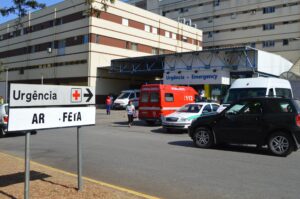A new study published by “Nature Journal Climate Change” on August 8, 2022, concluded that over half of known human pathogenic diseases can be aggravated by climate change.
Climatic hazards of the Earth’s climate system, intensified by the emission of greenhouse gases (GHGs), can exacerbate human pathogenic diseases, causing society disruption, as very clearly shown by the COVID-19 pandemic, giving humanity a glance of the horrifying health crises related to climate change that might happen.
The potentially large number of interactions resulting from the combination of the numerous climatic hazards and the numerous pathogens (unfortunately, many more than Covid…) reveal how far climatic hazards can aggravate human pathogenic diseases.
Climatic hazards bring pathogens closer to people and people closer to pathogens, facilitating the contact and strengthening the pathogens’ multiplication and action.
Within the most common ecological indications of climate change are the shifts in the geographical range of species. Habitat disruptions caused by warming, drought, heatwaves, wildfires, storms, floods and land cover change are associated with bringing pathogens closer to people.
Changes in precipitation and temperature were also noted to affect human social gatherings and the transmissibility of viruses such as influenza and COVID-19.
Climatic hazards have also diminished human capacity to deal with pathogens by altering body condition, adding stress from exposure to hazardous conditions, forcing people into unsafe conditions, damaging infrastructures and reducing access to medical care. Immunocompetence to disease is severely affected, beyond doubt.
The global distress caused by the emergence of COVID-19 clearly revealed the considerable human vulnerability to pathogenic diseases, with millions of deaths, an inexplicable amount of human suffering, as well as severe socioeconomic consequences.
Long COVID
“Long COVID” means that symptoms carry on even after COVID infection has resolved. It can also mean having new health problems after the COVID infection.
Most COVID infections get better within the first four weeks.
Science considers there are two types of long COVID:
- Ongoing symptomatic COVID: When COVID symptoms carry on for four to 12 weeks
- Post-COVID Syndrome: When COVID symptoms carry on for over 12 weeks
The time it takes for someone to get better from COVID varies from person to person. The length of time a person is ill does not always link to how ill they were when they had COVID, or whether if they were in hospital.
Most people recover within a few weeks, but some people, even those who had mild versions of the disease, might have symptoms that last for a long time afterwards. These ongoing health problems are more usually called post-COVID-19 syndrome, post-COVID conditions, long COVID-19.
In post-COVID-19 syndrome, people can experience a variety of new, returning or ongoing symptoms, more than four weeks after getting COVID-19. In some people, it might last months or years or even cause disability.
Research suggests that between one month and one year after having COVID-19, one in five people aged 18 to 64 has at least one medical condition that might be due to COVID-19. Among people aged 65 and older, one in four has at least one medical condition that might be due to COVID-19.
It can be hard to tell if symptoms are due to COVID-19 or another cause, such as a preexisting medical condition.
People who had severe illness with COVID-19 might have suffered organ damage, affecting the heart, kidneys, skin and brain. Inflammation and problems with the immune system can also happen. It is not clear how long these effects might last and could also lead to the development of new conditions, such as diabetes or a heart or nervous system condition.
Post-COVID-19 syndrome also appears to be more common in adults than in children and teens. However, anyone who gets COVID-19 can have long-term effects, including people with no symptoms or mild illness.
Fifth dose of Covid vaccine
The COVID-19 pandemic is not over and it is possible to have an increased spread during the coming autumn and winter season.
A fifth dose of vaccine will most certainly be recommended for the elderly and at-risk groups.
An influenza vaccine can be co-administered with the additional booster dose of COVID-19 vaccine.
And Monkeypox
Human monkeypox is a zoonotic (meaning caused by germs that spread between animals and people) viral disease caused by the monkeypox virus.
Monkeypox does not spread easily between people. Human-to-human transmission occurs through close contact with infectious material from skin lesions of an infected person, respiratory droplets in prolonged face-to-face contact as well as clothes or objects. The predominance, in the current outbreak, are cases among men who have sex with men and the nature of the presenting lesions suggests, in some cases, that transmission occurred during sexual intercourse.
It should be noted that the likelihood of spread to the broader population is low and that most cases in the current outbreaks have presented with mild symptoms.
Mortality is higher among children and young adults, and immunocompromised individuals are especially at risk of severe forms of the disease. Most people recover within weeks.
The likelihood of further spread of the virus through close contact, for example during sexual activities, is considered to be high. The likelihood of transmission between individuals without close contact is considered to be very low.
Treatment is mainly symptomatic and supportive, including prevention and treatment of secondary bacterial infections.
The smallpox vaccine can provide cross-protection for the monkeypox virus. If administered within the first four days after exposure to a confirmed monkeypox case, it can have a significant protective effect. In addition, antivirals are potential treatment options for severe cases.
But not only…
Many, many more diseases are still around…
Humans should never forget the countless health hazards that they can suffer from.
Preventing health problems and treating and controlling the previous existing ones is the foundation for a good life.
Nevertheless, people should never forget that all must be sustained by taking good care of the environment.
So, life goes on … the way we choose to live it. It is our decision.
Best healthy wishes,
Dra. Maria Alice Pestana Serrano e Silva
|| features@algarveresident.com
Dr Maria Alice is a consultant in General and Family Medicine. General Manager/Medical Director – Luzdoc International Medical Service. Administration Assessor – Grupo Hospital Particular do Algarve



















